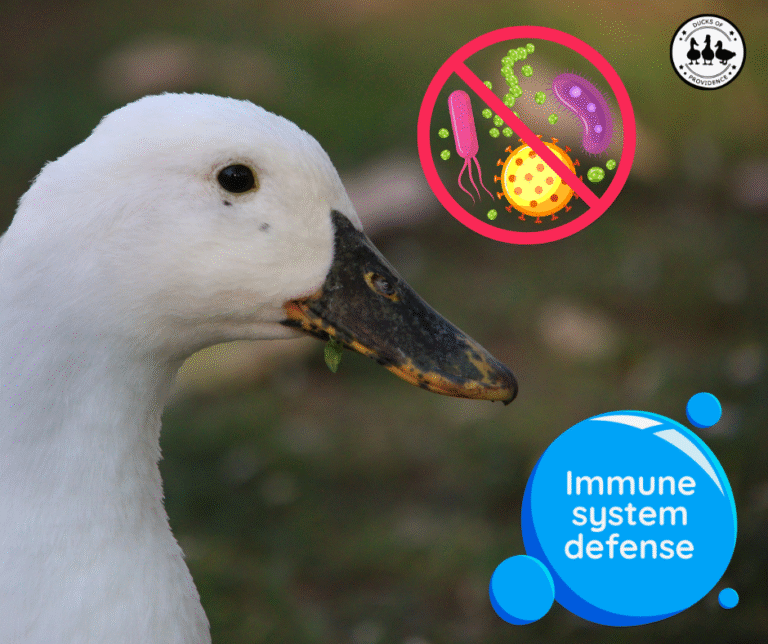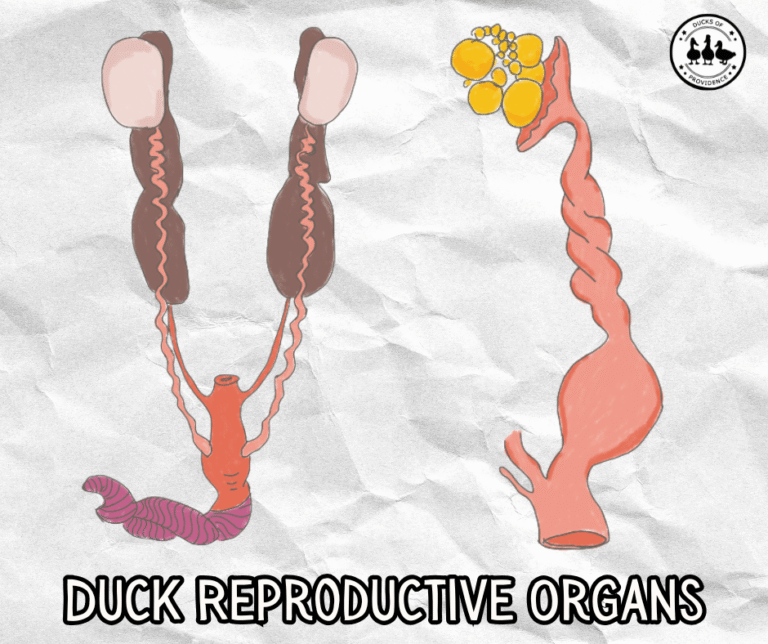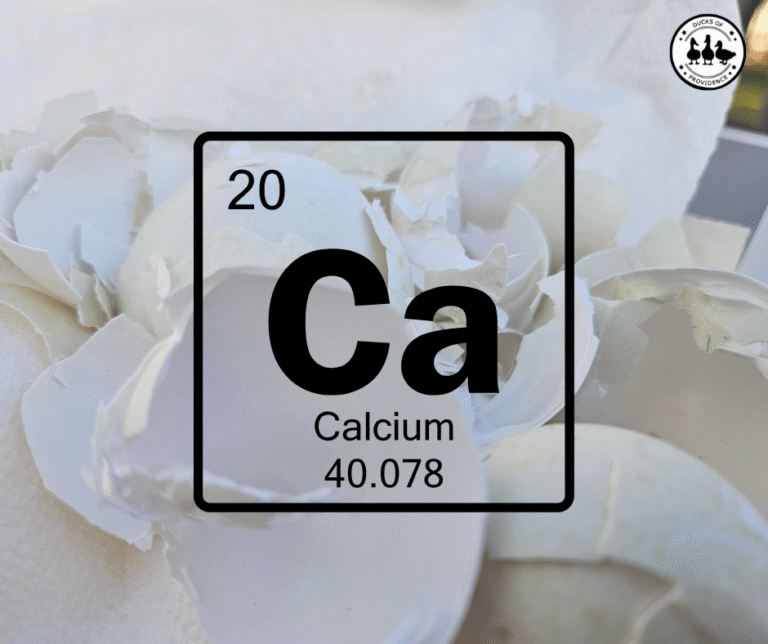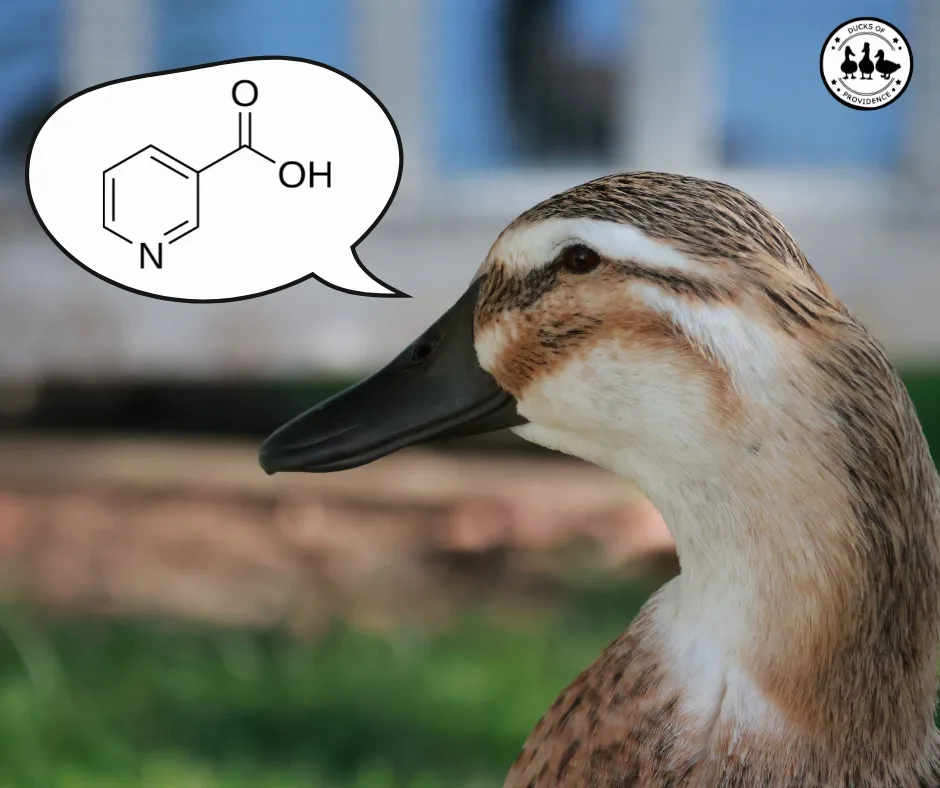
The Importance of Niacin for Ducks: What Every Duck Keeper Should Know
Last updated on March 9th, 2025 at 06:59 pm
Niacin, also known as vitamin B3, plays a crucial role in the health and development of ducks. Unlike chickens, ducks require significantly higher levels of niacin in their diets, especially during their rapid growth stages. A deficiency in this essential vitamin can lead to severe health issues, so understanding its importance is key to keeping your feathered friends happy and thriving.
Ducks of Providence is free, thanks to reader support! Ads and affiliate links help us cover costs—if you shop through our links, we may earn a small commission at no extra cost to you. Thanks for helping keep our content free and our ducks happy! 🦆 Learn more
Why Do Ducks Need Niacin?
Niacin is essential for ducks because it supports their metabolism, promotes healthy growth, and maintains strong muscles and bones. Since ducks grow quickly, especially in the first few weeks of life, their nutritional needs are much higher than other poultry.
Without adequate niacin, ducks may suffer from:
- Leg Weakness: Ducks with niacin deficiency often have trouble walking, developing symptoms such as bowed legs or an inability to stand.
- Slipped Tendons: This condition can make movement painful and lead to long-term mobility issues.
- Poor Growth: Ducks lacking niacin may be smaller and less active than their healthy counterparts.
What Is Niacin and How Does It Work?
Niacin, also called vitamin B3, is a water-soluble vitamin that belongs to the B-complex family. It plays a pivotal role in numerous biological processes essential for energy production, growth, and cellular repair. Chemically, niacin exists in two primary forms: nicotinic acid (or niacin) and nicotinamide (or niacinamide), both of which are used by the body to perform critical functions.

In Ducks, Niacin Supports:
- Metabolism of Carbohydrates, Proteins, and Fats: Niacin is a precursor for two important coenzymes, NAD (nicotinamide adenine dinucleotide) and NADP (nicotinamide adenine dinucleotide phosphate). These coenzymes are essential in over 400 enzymatic reactions, including energy production and cellular respiration.
- Cellular Health and DNA Repair: NAD and NADP are also involved in repairing damaged DNA, ensuring proper cell function and regeneration. This is particularly important in fast-growing ducklings.
- Circulatory and Nervous System Support: Niacin helps maintain the health of the nervous system, blood vessels, and skin, promoting overall well-being and vitality.
- Skeletal Development: Niacin is vital for the proper growth and development of a duck’s bones and joints. Ducks, especially fast-growing breeds like Pekins, require high levels of niacin to prevent leg deformities and mobility issues such as perosis (slipped tendon disorder).
- Feather Growth and Maintenance: Adequate niacin supports the synthesis of keratin and other proteins essential for strong, healthy feathers.
- Immune Function: Niacin helps bolster the immune system, enabling ducks to resist infections and recover more quickly from illnesses.
Which Form is More Important for Ducks?
Nicotinamide is generally more significant for ducks because it is the form used directly in enzymatic reactions and metabolic pathways. While both nicotinic acid and nicotinamide can fulfill niacin needs, nicotinamide is non-flushing and easier for the body to process. Some feeds may contain one or both forms to meet the niacin requirements of ducks.
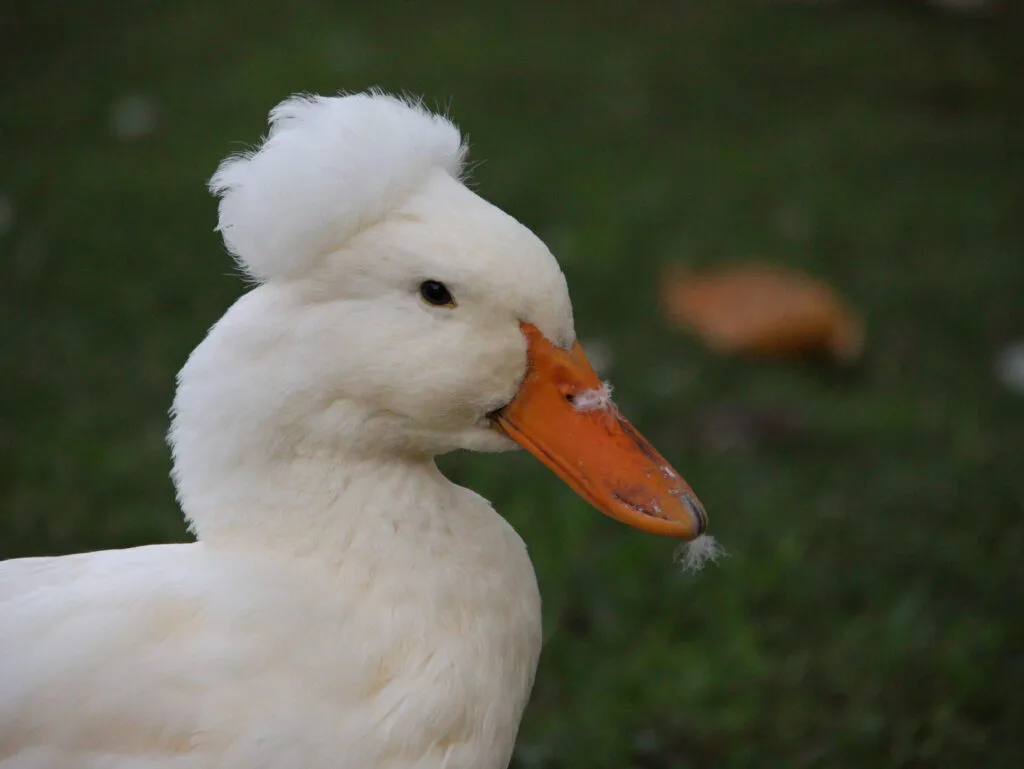
Why Are Ducks More Dependent on Niacin?
Ducks have a higher metabolic rate compared to other poultry, meaning their energy demands are significantly greater. Niacin is vital for fueling this energy demand, especially during periods of rapid growth, such as the first 8 weeks of life.
Unlike humans, ducks cannot synthesize sufficient niacin from tryptophan, an amino acid found in protein-rich foods. While some conversion occurs, the amount is negligible compared to their dietary needs. This makes them dependent on direct dietary sources of niacin.
The Biochemistry of Niacin in Ducks
When ducks consume niacin-rich foods or supplements, it is absorbed through the small intestine. From there, it is transported via the bloodstream to cells throughout the body, where it is converted into NAD and NADP. These coenzymes are then used in metabolic pathways like:
- Glycolysis: Breaking down glucose for energy.
- The Krebs Cycle: A key part of cellular respiration that generates ATP (the energy currency of cells).
- Fatty Acid Synthesis and Oxidation: Essential for the development of strong muscles and maintaining healthy plumage.
This biochemical efficiency ensures that ducks can grow, thrive, and maintain their high levels of activity.
How Niacin Deficiency Affects Ducks
When ducks don’t receive adequate niacin, their bodies cannot generate enough NAD and NADP to sustain critical metabolic processes. This deficiency disrupts energy production and cellular repair, leading to the following issues:
- Leg Deformities and Weakness: Due to inadequate energy and poor bone formation, ducks may exhibit bowed legs, swelling in joints, or an inability to stand.
- Reduced Growth Rates: Without enough niacin, ducklings struggle to metabolize food efficiently, resulting in stunted growth.
- Neurological Problems: Niacin deficiency can affect the nervous system, leading to lethargy and impaired motor functions.
How Much Niacin Is Too Much?
Ducks have a high tolerance for niacin compared to humans and other animals, so over-supplementation is rarely a concern. However, it’s always best to stick to recommended guidelines to avoid unnecessary waste or potential imbalances in their diet.
By understanding the biochemistry and role of niacin in your ducks’ health, you’re better equipped to meet their nutritional needs and address any challenges that arise. This semi-scientific approach ensures your flock gets the right balance of nutrients to grow strong, healthy, and happy!
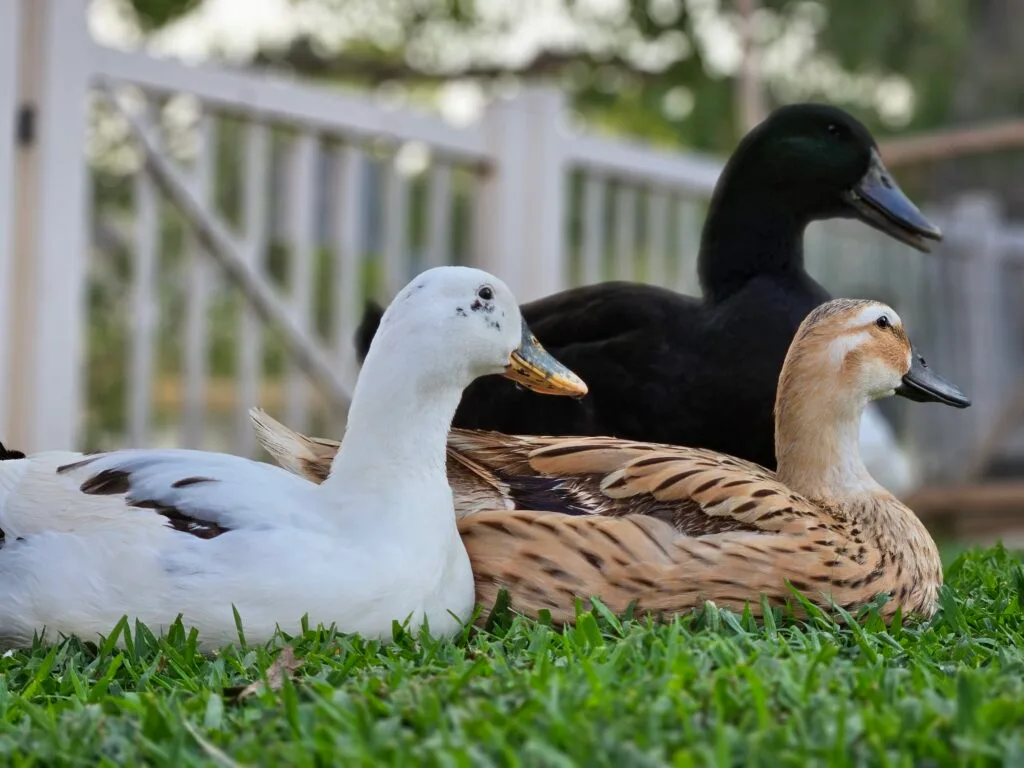
The Essential Role of Niacin in Duck Health
Niacin’s Role in Bone Development and Leg Strength
Niacin (vitamin B3) is a cornerstone nutrient for proper bone development and leg strength in ducks, particularly during the rapid growth phases of ducklings. This water-soluble vitamin plays a pivotal role in supporting skeletal health through various metabolic and physiological mechanisms. Ducks are especially prone to leg issues if their niacin levels are inadequate. This is because niacin is crucial for the formation of strong, healthy bones and for maintaining proper joint function.
1. Niacin and Bone Growth
Ducks grow quickly, especially during the first few weeks of life. To support this accelerated development, their bones must form and strengthen at a rapid pace. Niacin contributes to this process by:
- Enhancing Collagen Formation: Collagen is a structural protein critical for developing strong, flexible bones. Niacin aids in collagen synthesis by providing the energy and cofactors needed for cell metabolism in bone tissue.
- Supporting Calcium Absorption: Although niacin is not directly involved in calcium absorption, its role in overall metabolic efficiency ensures that ducks can effectively utilize dietary calcium and phosphorus—two minerals essential for bone hardness and growth.
2. Prevention of Skeletal Deformities
A lack of niacin in a duck’s diet can lead to skeletal deformities, most notably perosis or slipped tendon disorder. This condition is characterized by:
- Swollen joints, particularly in the legs.
- Bowed or crooked legs that hinder walking and foraging.
- Tendons slip out of their normal position, leading to immobility or chronic pain.
Niacin prevents these issues by ensuring proper cartilage development and maintaining the structural integrity of connective tissues that support tendons and ligaments.
3. Muscle and Joint Strength
The skeletal system does not act alone—it works in concert with muscles and joints. Niacin contributes to energy production at the cellular level, providing the fuel that muscles need to function effectively. Strong muscles reduce strain on bones and joints, improving leg strength and overall mobility.
4. Support During Rapid Growth
Fast-growing duck breeds like Pekins have an even higher demand for niacin due to their heavier frames. Without adequate niacin, these ducks are at risk for underdeveloped or weak leg bones, which can lead to difficulty walking or standing.
Ducklings on low-niacin diets often exhibit signs of fatigue and reluctance to move, as their legs cannot support their growing bodies. Early supplementation of niacin during this critical period ensures ducks develop sturdy bones and avoid long-term mobility issues.
5. Niacin’s Indirect Role in Injury Prevention
Healthy bones and legs are less prone to fractures or injuries, especially for ducks that are active or free-ranging. Niacin’s contribution to bone density and ligament strength minimizes the likelihood of sprains or breaks, which are common in niacin-deficient ducks.
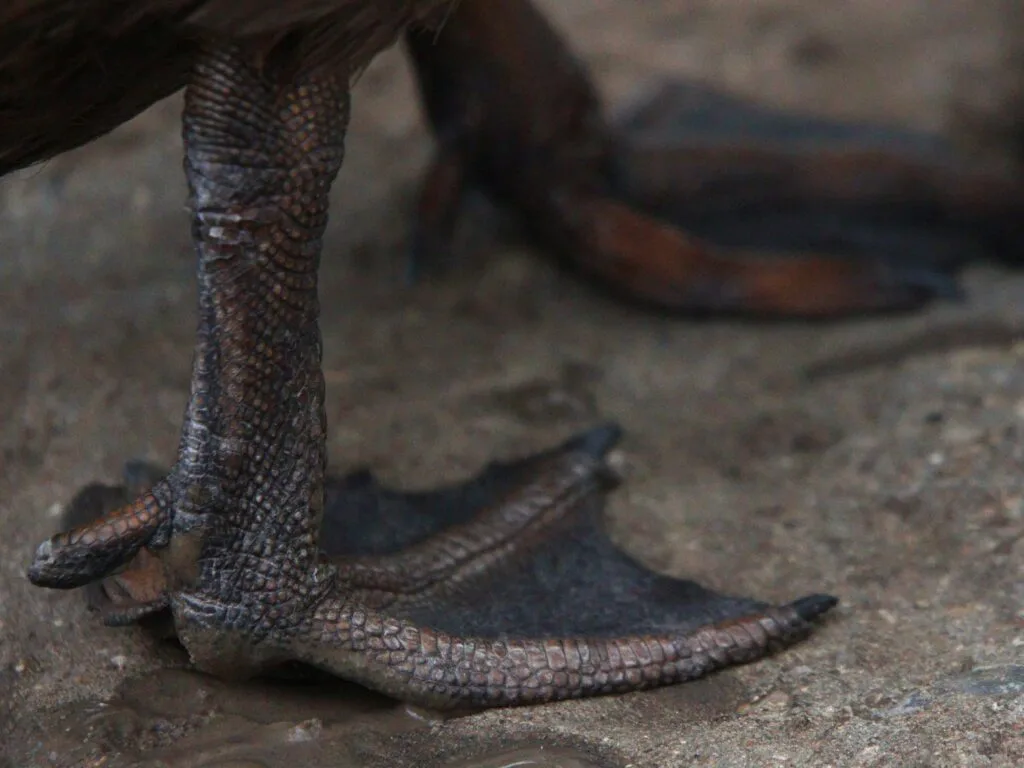
Niacin’s Role in the Immune Health of Ducks
Niacin plays a crucial role in supporting and strengthening the immune system in ducks, contributing to their ability to fight off infections, recover from illnesses, and maintain overall health. Here’s how niacin supports immune function:
1. Cellular Repair and Immune Cell Production
Niacin is a key player in energy metabolism, which fuels the production of immune cells such as macrophages, lymphocytes, and neutrophils. These cells are responsible for identifying, attacking, and neutralizing pathogens like bacteria, viruses, and fungi. Nicotinamide, in particular, is involved in DNA repair mechanisms, ensuring that damaged immune cells can be restored efficiently, which is vital during an immune response.
2. Anti-Inflammatory Effects
Niacin, through its role in creating NAD+ and NADP+ coenzymes, regulates inflammatory processes in the body. It modulates cytokine production—proteins that signal immune responses. Balanced cytokine activity prevents chronic inflammation, which could otherwise weaken the duck’s immune system and make them more susceptible to infections or stress-induced diseases.
3. Barrier Protection
A healthy immune system relies on the integrity of physical barriers like the skin and mucous membranes, which are the first line of defense against pathogens. Niacin supports the production of keratin and other proteins essential for maintaining strong, intact feathers and skin. This prevents pathogens from gaining entry and spreading through cuts, abrasions, or weak spots.
4. Antioxidant Defense
Niacin aids in the production of glutathione, one of the body’s most potent antioxidants. Antioxidants neutralize free radicals generated during immune responses or as a result of environmental stressors (e.g., UV exposure or poor water quality). By reducing oxidative stress, niacin helps preserve the functionality of immune cells and prevents cellular damage.
5. Enhanced Stress Tolerance
Immune suppression can occur when ducks face stress from environmental changes, predator threats, or illness. Niacin supports the production of stress-response proteins, which help ducks cope with these challenges. This, in turn, strengthens their immune resilience, making them less likely to succumb to opportunistic infections.
6. Protection Against Nutritional Stress
Deficiencies in niacin can lead to weakened immunity, making ducks prone to diseases like respiratory infections or diarrhea. This is especially important for ducklings, whose immune systems are still developing. By ensuring adequate niacin levels, the body can effectively produce enough immune cells to keep infections at bay.
7. Support for Gut Health
A large part of immune function is rooted in the gut. Niacin promotes healthy gut microbiota by aiding in the maintenance of the intestinal lining and reducing inflammation in the digestive tract. A healthy gut helps ducks absorb nutrients better and prevents harmful pathogens from invading.
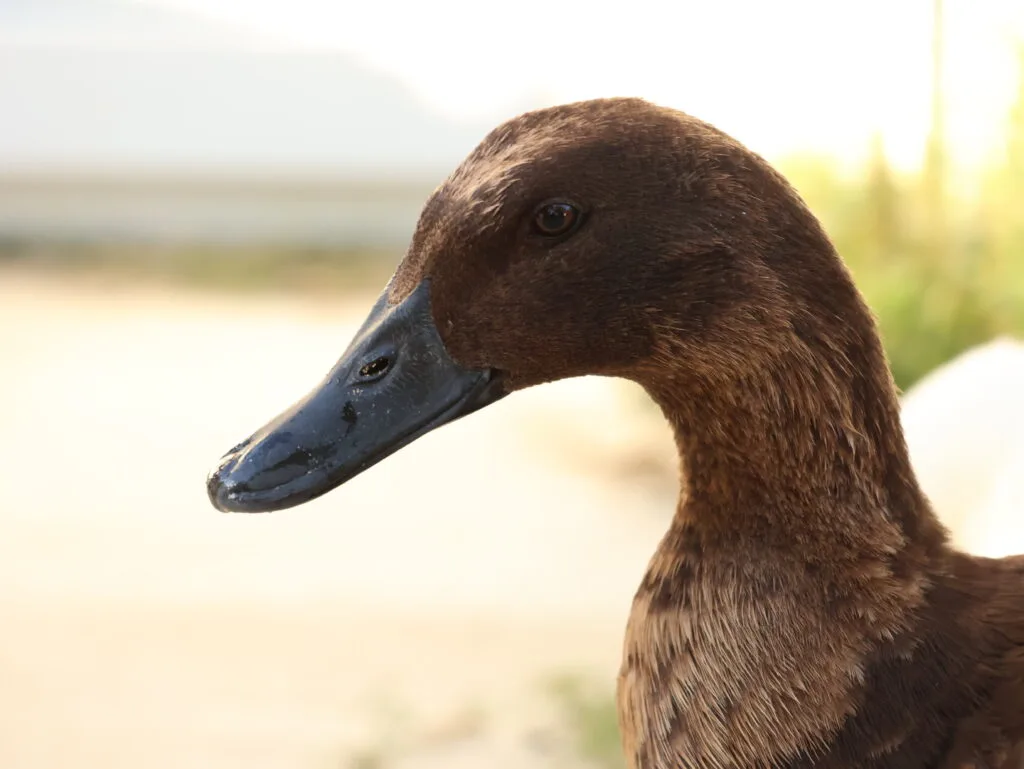
Neurological Problems: The Impact of Niacin Deficiency on the Nervous System
Niacin is critical for maintaining a healthy and functional nervous system in ducks. A deficiency in this essential nutrient can significantly disrupt neurological processes, leading to symptoms that affect mobility, behavior, and overall well-being.
1. Lethargy and Low Energy
Niacin plays a key role in energy production within the nervous system. It is essential for the synthesis of nicotinamide adenine dinucleotide (NAD+), a coenzyme involved in cellular respiration and energy transfer. Without adequate niacin, nerve cells cannot generate enough energy to function optimally, resulting in:
- Lethargy: Ducks may appear excessively tired, show reduced activity levels, and seem less responsive to their environment.
- Reluctance to Move: A lack of energy in nerve cells can make even basic movements seem like a struggle.
2. Impaired Motor Functions
Niacin deficiency can disrupt communication between the brain and muscles, leading to a breakdown in motor control. This manifests as:
- Uncoordinated Movements: Ducks may stumble, trip, or display shaky and uneven gaits.
- Weakness in Legs: Combined with skeletal issues, niacin deficiency can severely impair leg strength, further affecting the ability to walk or stand.
- Tremors: In severe cases, ducks may exhibit uncontrollable shaking due to compromised nerve function.
3. Behavioral Changes
Neurological problems caused by niacin deficiency can also alter a duck’s behavior. Ducks may become unusually quiet, withdrawn, or show signs of irritability due to discomfort or a lack of stimulation in the nervous system.
4. Developmental Issues in Ducklings
Young ducks are particularly vulnerable to the neurological effects of niacin deficiency because their nervous systems are still developing. Symptoms in ducklings can include:
- Delayed Reflexes: Slower responses to stimuli, such as sound or movement.
- Inability to Swim Properly: Poor coordination can make swimming difficult or impossible, putting them at risk of drowning in water sources.
5. Long-Term Consequences
If niacin deficiency is not addressed, prolonged damage to the nervous system can lead to permanent motor impairments, severe weakness, or an inability to survive in the flock. Ducks with long-term neurological issues may require special care and support.
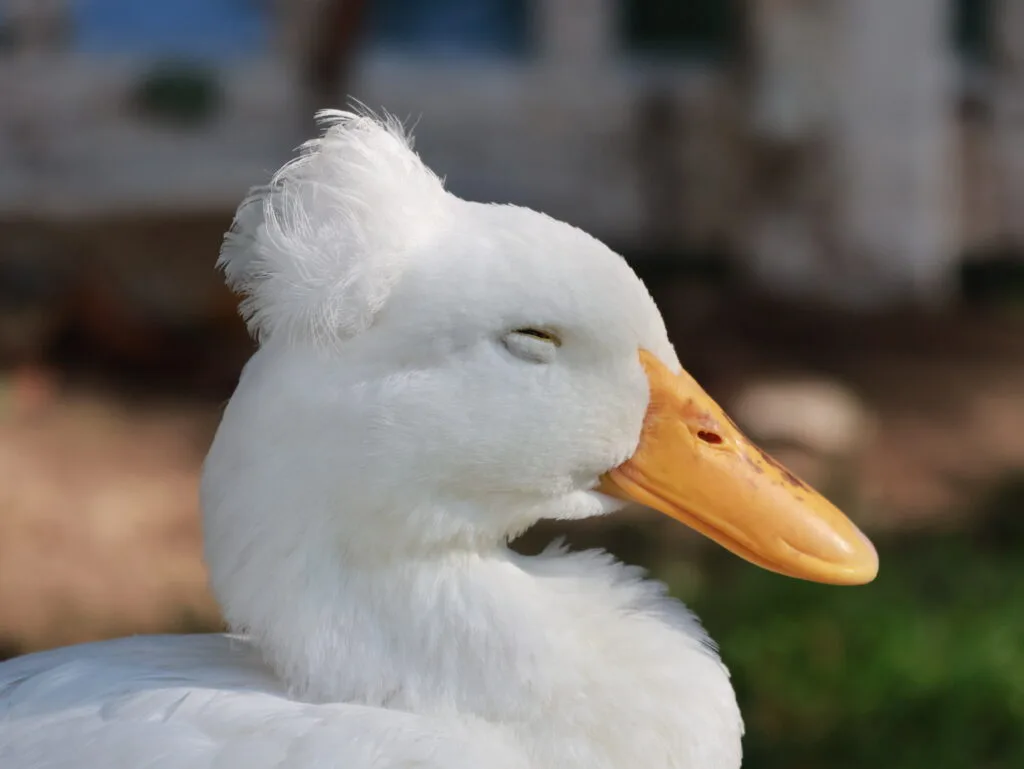
How Much Niacin Do Ducks Need?
The niacin requirements for ducks depend on their age, growth stage, and overall activity level. For ducklings, niacin is especially crucial during the first eight weeks of life, a period of rapid growth and bone development.
Niacin Needs in Ducklings
Ducklings require 55 to 70 milligrams of niacin per kilogram of feed during their first eight weeks. This higher concentration supports their fast-paced development, ensuring they grow strong bones, healthy muscles, and a robust nervous system.
Niacin Needs in Adult Ducks
After the initial eight weeks, the niacin requirement decreases slightly, but it remains higher than that of chickens. Adult ducks should get 12.5 mg per day and at least 50 mg of Niacin per kg feed because they still need adequate levels of niacin for:
- Maintaining joint health and preventing leg weakness.
- Supporting metabolic functions that keep them active and healthy.
How Do Ducks Compare to Chickens?
It’s a common misconception that ducks and chickens have similar nutritional needs. While chickens can synthesize enough niacin from the amino acid tryptophan in their diet, ducks cannot produce sufficient amounts on their own. This makes ducks entirely reliant on dietary sources of niacin.
- Chicken Starter Feed: Typically contains around 30 mg of niacin per kilogram, which is insufficient for ducklings unless supplemented.
- Duck Starter Feed: Formulated with the higher niacin levels required by ducklings, usually falling within the ideal range of 55–70 mg/kg.
Beyond the First Eight Weeks
For laying ducks or those in high-energy conditions, such as cold weather or molting, niacin needs may increase slightly again. Providing a balanced diet with consistent niacin levels ensures ducks remain in optimal health throughout their lives.
Monitoring your ducks’ growth, behavior, and physical condition can help you identify if their diet needs adjusting. Always prioritize feeds designed specifically for ducks or supplement appropriately to meet their nutritional demands.
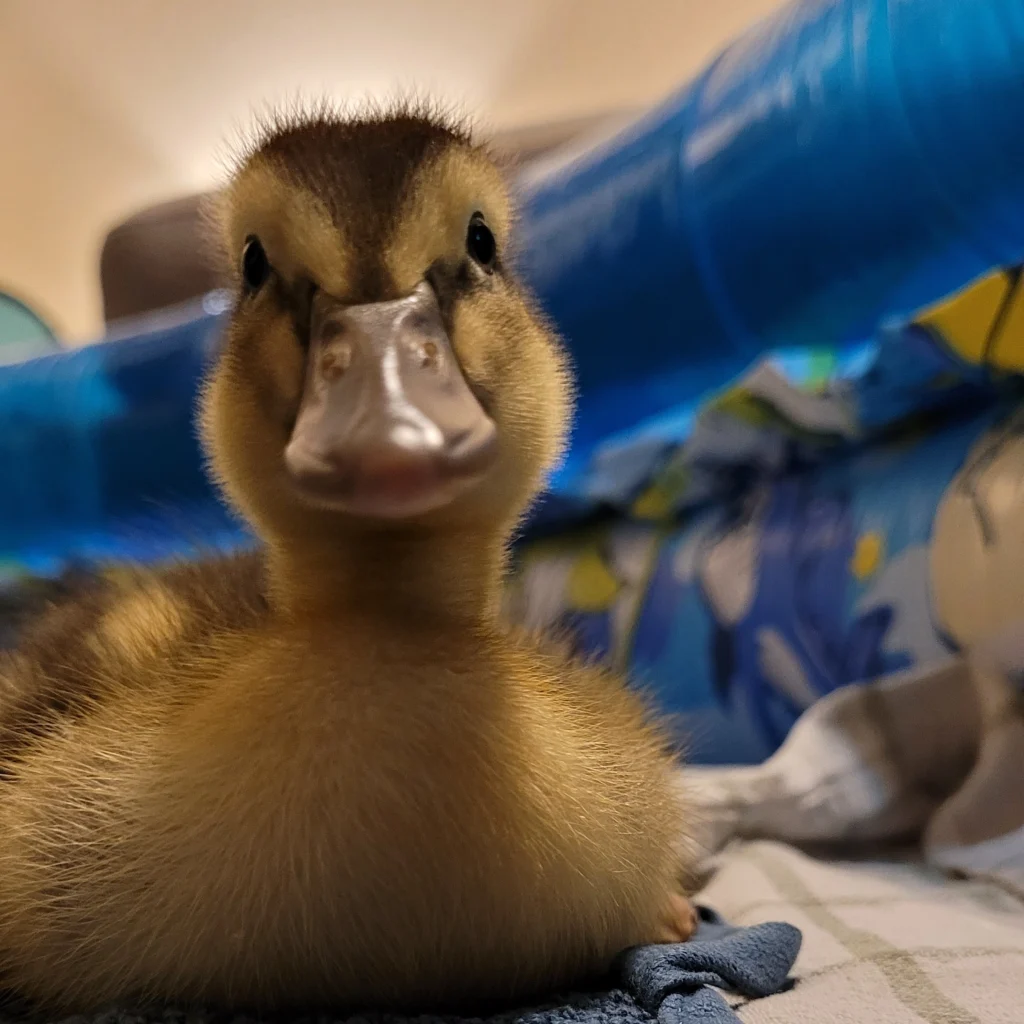
Sources of Niacin for Ducks
Providing your ducks with sufficient niacin is essential to their health and development, particularly during their early growth stages. This can be achieved through a combination of specialized feed, supplements, and natural food sources. Here are some effective ways to ensure your ducks get the niacin they need:
1. Duck-Specific Feed
Starting your ducklings on a high-quality, duck-specific feed is one of the best ways to ensure they receive the essential nutrients they need, including the right levels of niacin. Duck-specific starter feeds are carefully formulated to meet the nutritional requirements of ducklings, providing the ideal balance of protein, vitamins, and minerals to support their rapid growth and development. Look for feeds labeled as “duck starter” or “waterfowl feed,” which generally contain 55–70 mg of niacin per kilogram.
We highly recommend the following options for their consistent quality and nutritional profile:
- Mazuri Waterfowl Starter Food for Baby Ducks and Geese: This premium feed is specifically designed for waterfowl and offers a balanced diet with optimal niacin levels. It contains no less than 70 mg/lb (154 mg/kg) of niacin, perfectly tailored for young ducks. Mazuri’s formula is also non-medicated and includes probiotics to support digestive health. Its small pellet size makes it easy for ducklings to eat and digest.
- Manna Pro Duck Starter Grower Crumble: Another excellent choice, this crumble feed is formulated to provide ducklings with the nutrients they need for strong bones, healthy feathers, and overall vitality. With added niacin 35 mg/lb (77 mg/lb) and other vitamins, it ensures your growing ducks stay on track during their critical early stages. The crumble texture is soft and easy for ducklings to consume.
These feeds eliminate the guesswork involved in balancing a duckling’s diet. By choosing a trusted duck-specific feed, you provide your flock with a strong foundation for health and growth. For duck owners who want a simple yet effective feeding solution, these brands consistently deliver outstanding results.
ℹ️ Pro Tip: When purchasing feed, check the expiration date to ensure freshness and store it in a cool, dry place to maintain its nutritional value.
2. Supplementing Chick Starter Feed
If duck-specific feed is unavailable in your area or challenging to source, chick starter feed can serve as an alternative for your ducklings. However, it’s important to note that chick starter feed typically contains insufficient levels of niacin to meet the higher needs of ducks. Without supplementation, relying solely on chick feed may lead to niacin deficiency, which can cause severe issues like leg deformities and stunted growth.
To bridge this nutritional gap, you can enhance chick starter feed by incorporating niacin-rich supplements. Also, if you’re unsure about the niacin content in their feed, consider supplementing their diet with additional niacin. You can do this by adding brewer’s yeast to their feed or niacin supplements to their water, as recommended by Metzer. Here is a closer look at these two highly effective options:
Brewer’s Yeast
Brewer’s yeast is a convenient, natural supplement that’s rich in niacin and offers additional benefits, such as B-complex vitamins that support overall health and vitality. To use brewer’s yeast:
- Add approximately 1 tablespoon of brewer’s yeast per cup of feed.
- Mix it thoroughly into the feed to ensure an even distribution, so each duckling gets an adequate dose.
- Brewer’s yeast is also a natural, holistic option that supports digestive health and immune function in addition to meeting your ducklings’ niacin needs.
Brewer’s yeast is readily available at most health food stores, online retailers, and farm supply shops, making it a popular choice among duck owners. We love Fresh Eggs Daily Brewer’s Yeast, a trusted brand known for its high-quality formulation. It’s easy to use—simply add approximately 1 tablespoon of brewer’s yeast per cup of feed and mix well. Not only does it help meet niacin needs, but it also promotes healthy feathers and boosts energy levels.
Niacin Powder or Capsules
Another effective method is to supplement with pure niacin in powder or capsule form. This approach allows for precise dosing, ensuring your ducklings receive the exact amount of niacin they need. Here are some tips:
- Use plain niacin supplements, as “flush-free” or “slow-release” versions are not bioavailable to ducks and will not be effective.
- Mix the niacin powder into the feed at the recommended dosage based on your ducklings’ weight and feed amount.
- A general guideline is to achieve a niacin content of 55–70 mg/kg of feed.
- It is recommended that ducklings get >70mg of Niacin per kg feed (or 10 mg of Niacin per day).
- Adult ducks should get 12.5 mg per day and at least 50 mg of Niacin per kg feed.
- Monitor your flock closely to ensure they are eating well and not experiencing any adverse effects.
We have supplemented our duckling’s drinking water with this Niacin just to be on the safe side. Using a small measuring spoon, we added 150 mg of niacin to a gallon of water.
Additional Tips for Supplementing Chick Feed
- Avoid Over-Supplementation: While niacin is crucial, too much can also be harmful. Stick to recommended dosages and adjust based on the feed manufacturer’s label.
- Combine with Natural Sources: You can also include niacin-rich treats like peas alongside the supplemented feed for added variety and nutrition.
By taking these simple steps to supplement chick starter feed, you can ensure your ducklings grow up strong, healthy, and full of vitality, even when duck-specific feed isn’t available. Proper supplementation is a small effort that makes a big difference in your flock’s well-being.
3. Natural Sources of Niacin
Incorporating natural sources of niacin into your ducks’ diet is a great way to boost their nutritional intake and provide variety. Many common foods are rich in niacin and can be offered as treats or part of a balanced feeding routine. However, it’s important to use these foods as a complement to a nutritionally complete base feed, not as a replacement.
Niacin-Rich Vegetables
Certain vegetables are excellent natural sources of niacin, providing essential vitamins and minerals while diversifying your ducks’ diet. These can be offered raw or lightly steamed (without seasoning) for easier digestion:
- Peas: One of the best natural sources of niacin, peas are a favorite among ducks. They are easy to serve and can be offered fresh or thawed from frozen.
- Sweet Potatoes: Packed with niacin and other nutrients, cooked and mashed sweet potatoes make a nutritious and delicious treat. Always cook sweet potatoes thoroughly before serving them to ducks, as raw sweet potatoes can be difficult for ducks to digest and may cause gastrointestinal issues. Cooking softens their texture, making them easier for ducks to consume.
- Green Beans: These are another great option, offering a boost of niacin along with fiber to aid digestion. However, green beans must be cooked thoroughly before being fed to ducks. Raw or undercooked green beans contain phytohaemagglutinin, a toxin that can be harmful to birds. Cooking neutralizes this toxin, making the beans safe to consume.

Protein-Rich Foods
Protein-rich treats are not only excellent for niacin but also provide amino acids necessary for feather growth and overall development:
- Mealworms: A high-protein snack and a fantastic natural source of niacin. Offer them dried or live as a treat in moderation.
- Fish or Fish Meal: Small fish or fish meals are rich in niacin and protein. However, these should be offered sparingly to avoid overloading on protein.
Fruits for Variety
While fruits generally have less niacin than vegetables and proteins, they can still contribute to your ducks’ intake while serving as a refreshing treat:
- Bananas: Contain a modest amount of niacin and are often well-loved by ducks when sliced into manageable pieces.
Whole Grains
Whole grains can also provide a natural boost of niacin:
- Oats: Rolled or steel-cut oats (soaked or cooked) can be added as a supplemental food that offers both niacin and energy.
- Barley: Another nutritious grain that supports your ducks’ overall health.
Foraging Opportunities
Allowing your ducks to forage can also enhance their access to natural niacin sources. Ducks enjoy eating insects, plants, and algae from their environment, which often contain trace amounts of niacin. If you have a safe outdoor area for your flock, encourage foraging to mimic their natural feeding behavior.
4. Feeding Tips
- Moderation is Key: While natural foods are healthy, they should not exceed 10–20% of your ducks’ total diet to ensure they are still receiving all necessary nutrients from their main feed.
- Chop or Cook When Needed: To prevent choking or digestive issues, chop larger foods into manageable pieces and cook starchy vegetables like sweet potatoes.
- Serve Fresh: Cooked vegetables should be served fresh, as spoiled or stale foods can pose health risks.
- Rotate Treats: Offering a variety of niacin-rich foods keeps your ducks excited about their meals and ensures a broad nutrient intake.
By integrating these natural sources of niacin into your ducks’ feeding routine, you can enhance their overall health, encourage natural foraging behavior, and provide a delicious variety of treats. Just remember to cook foods like green beans and sweet potatoes thoroughly and use them as part of a balanced diet to maximize the benefits!
5. Avoiding Common Pitfalls
While supplementing niacin, it’s important to avoid overdoing it or relying solely on treats. Treats should make up no more than 10% of your ducks’ daily diet to ensure they are primarily consuming a nutritionally balanced feed.
By combining high-quality feed, thoughtful supplementation, and occasional treats, you can confidently meet your ducks’ niacin needs and keep your flock healthy and thriving. Always observe your ducks for signs of niacin deficiency, especially during their rapid growth phases, and adjust their diet as needed.
How to Recognize Niacin Deficiency in Ducks
ItNiacin is essential for your ducks’ overall health and development, and a deficiency can lead to several troubling symptoms. Since niacin deficiency can progress quickly, it’s important to recognize the signs early so you can address the issue promptly and prevent long-term damage. If you notice any of the following symptoms in your ducks, it may be time to assess their diet and consider adding a niacin supplement.
1. Wobbly Walking or Difficulty Standing
One of the first signs of niacin deficiency in ducks is wobbly walking or difficulty standing. As niacin plays a crucial role in the proper functioning of muscles and nerves, a lack of this essential nutrient can result in a loss of coordination and weakness in the legs. Ducklings may appear to stagger or struggle to balance, especially when attempting to walk or stand.
2. Bowed Legs or Swelling in Joints
Niacin is vital for bone and joint health, and a deficiency can lead to bowed legs or swelling in the joints. The lack of niacin affects the structural integrity of bones, making them more vulnerable to deformities. You may notice that the legs of your ducks are not straight, and the joints, particularly in the knees or hocks, appear swollen or painful. This can also make it difficult for them to move around freely.
3. Reluctance to Move or General Lethargy
Ducks with niacin deficiency may display a general lack of energy and reluctance to move. They might become more sedentary, spending most of their time sitting or lying down, rather than foraging or interacting with the flock. Lethargy is often a result of the discomfort caused by joint issues and the overall weakness that comes with a lack of niacin. If you notice that your ducks are not as active or energetic as usual, niacin deficiency could be the cause.
4. Growth Issues
In ducklings, niacin deficiency can also cause stunted growth. Since niacin is involved in the conversion of carbohydrates into energy, a lack of it can hinder normal growth rates. You might notice that your ducklings are smaller or not gaining weight as expected. This can be particularly concerning in the first few weeks of life when rapid growth is crucial.
5. Abnormalities in Feathers and Skin
Though less common, niacin deficiency can affect the health of your ducks’ feathers and skin. Ducks may develop rough or patchy feathers, and their skin might appear dry or flaky. Niacin contributes to proper skin health, and without enough of it, the overall quality of your ducks’ feathers may deteriorate.
6. Neurological Issues and Seizures
A more severe sign of niacin deficiency can be neurological symptoms, such as seizures. Niacin plays an essential role in nervous system health, and without adequate levels, ducks may experience a range of neurological problems. This can include muscle tremors, disorientation, and seizures. Seizures can be a very concerning symptom and may indicate that the deficiency has reached a critical level. If you notice your ducks shaking or having involuntary movements, it is crucial to address the niacin deficiency immediately to prevent lasting damage to their nervous system.

How to Address Niacin Deficiency
If you recognize these symptoms in your ducks, it’s important to take immediate action to correct the deficiency. Supplementing their diet with niacin is the most effective way to address the problem.
1. Add Niacin to Drinking Water
One of the quickest and easiest ways to supplement niacin is by adding water-soluble niacin to your ducks’ drinking water. This ensures that the niacin is quickly absorbed into their system. Be sure to follow the recommended dosage, as too much niacin can lead to other health issues. Plain niacin is the best option, as it is free from additives, and it’s important to avoid “flush-free” or “slow-release” formulations, which are not as effective for ducks.
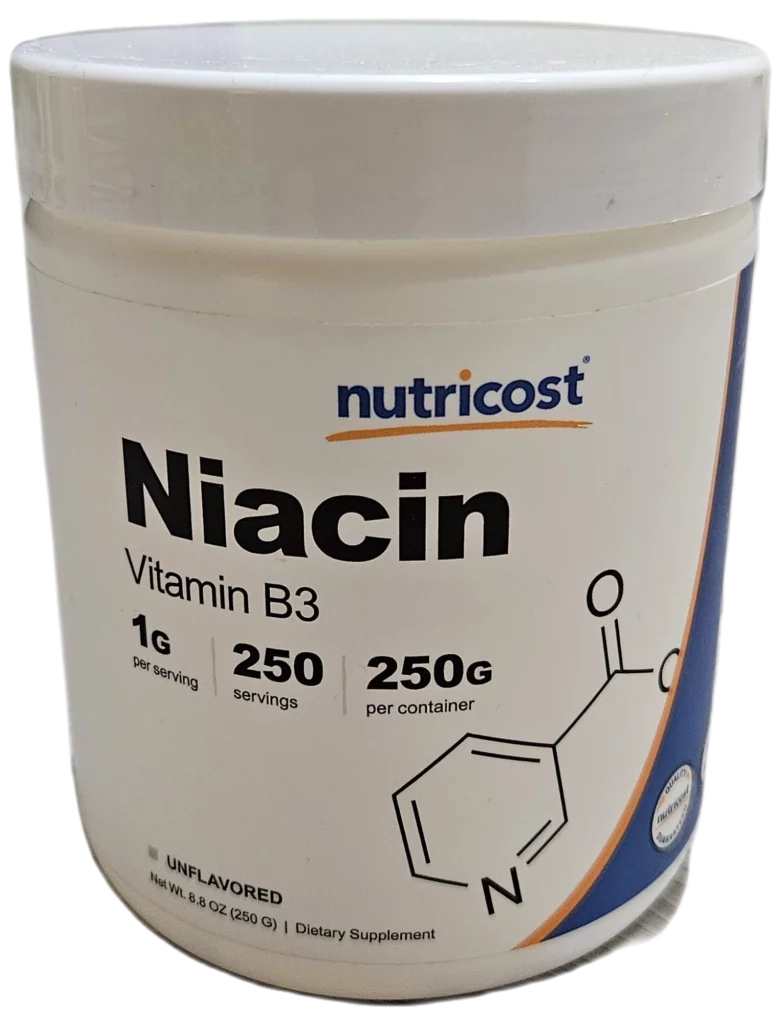
2. Niacin Supplements in Feed
In addition to adding niacin to their water, you can also mix niacin into your ducks’ regular feed. Niacin powder or tablets can be crushed and blended with the feed. Always ensure that the niacin is evenly distributed so each duck receives the appropriate amount.
3. Dietary Changes
Along with supplementation, make sure your ducks have access to niacin-rich foods such as peas, sweet potatoes, and brewer’s yeast. This will help boost their niacin intake through natural sources while you address the deficiency.
Prevention is Key
Preventing niacin deficiency is often easier than treating it, especially when ducks are young and still developing. To avoid this problem in the future:
- Always choose duck-specific feed that is formulated to meet their nutritional needs, including proper levels of niacin.
- If you are using chick starter feed, be sure to supplement it with niacin to ensure your ducklings are getting enough of this vital nutrient.
By staying proactive and vigilant, you can help your ducks thrive and avoid the complications that come with niacin deficiency. Early detection and prompt action are key to maintaining a healthy, happy flock!
A Final Note
Understanding the role of niacin in duck health is crucial for any duck keeper. By providing your ducks with the proper diet and ensuring they get enough of this vital vitamin, you’ll set them up for a lifetime of strong, happy waddles.
What are your favorite tips for keeping your ducks healthy and active? Share them below—let’s keep our flocks thriving together!
Related articles you may enjoy:
- Essential Nutritional Needs of Ducks: A Complete Overview
- Neurological Disorders in Ducks: Why They Happen and How to Prevent Them
- What do Pet Ducks Eat? A Guide to a Healthy and Nutritious Pet Duck Diet
- The Ultimate Guide to Healthy Duck Snacks: Treats Your Ducks Will Love
- How to Raise Ducklings: A Beginners Guide







